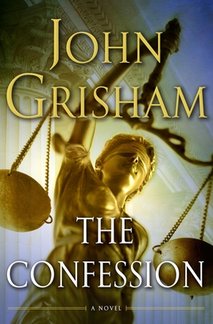
23 Nov 2010 02:47:59
Grisham presents a very convincing case against the death penalty in "The Confession." (His profile on the back flap of the book notes that he is on the board of directors of the Innocence Project in New York and Mississippi, a program dedicated to exonerating wrongfully convicted prisoners.)
The clock is ticking down for death-row inmate Donte Drumm, a former high-school football star convicted of the kidnapping, rape and murder of a popular young cheerleader.
Four days before Drumm is scheduled to die in the Texas death chamber, longtime criminal Travis Boyette, who says he's dying of a brain tumor, visits St. Mark's Church in Kansas and tells the Rev. Keith Schroeder that an innocent man is about to be executed for a crime that he committed.
Schroeder — and the reader_ are drawn into a desperate race to save Drumm.
Schroeder and Boyett eventually meet with lawyer Robbie Flak, whose clients are "the abused, the accused, the mistreated, the injured," and who has spent years trying to free Drumm.
A corrupt cop and prosecutor, and a former classmate who lied about Drumm's relationship to the cheerleader, aren't about to see a case that made them famous become unraveled. A governor who wants voters to see him as tough on crime isn't about to issue a pardon or even a delay.
Grisham's strong feelings about the death penalty are displayed throughout the book. He writes movingly of Drumm's decline during his years on death row, detailing how hope drained away from a young man who once seemed to be on top of the world.
His poignant picture of a mother washing and dressing her baby one last time, gently working on the body she has not been able to hug, kiss or even touch for so many years, will make even the most dedicated death-penalty proponents pause and reflect on their views.
But in the final chapters, Grisham belabors his points about the ultimate punishment, especially when he details Flak's news conference in which he endlessly goes over the case. The recap of everything the reader already knows drags on for pages.
At the end of the epilogue, however, Grisham again hits his stride, closing with a nice sense of irony that will stick with readers.
The clock is ticking down for death-row inmate Donte Drumm, a former high-school football star convicted of the kidnapping, rape and murder of a popular young cheerleader.
Four days before Drumm is scheduled to die in the Texas death chamber, longtime criminal Travis Boyette, who says he's dying of a brain tumor, visits St. Mark's Church in Kansas and tells the Rev. Keith Schroeder that an innocent man is about to be executed for a crime that he committed.
Schroeder — and the reader_ are drawn into a desperate race to save Drumm.
Schroeder and Boyett eventually meet with lawyer Robbie Flak, whose clients are "the abused, the accused, the mistreated, the injured," and who has spent years trying to free Drumm.
A corrupt cop and prosecutor, and a former classmate who lied about Drumm's relationship to the cheerleader, aren't about to see a case that made them famous become unraveled. A governor who wants voters to see him as tough on crime isn't about to issue a pardon or even a delay.
Grisham's strong feelings about the death penalty are displayed throughout the book. He writes movingly of Drumm's decline during his years on death row, detailing how hope drained away from a young man who once seemed to be on top of the world.
His poignant picture of a mother washing and dressing her baby one last time, gently working on the body she has not been able to hug, kiss or even touch for so many years, will make even the most dedicated death-penalty proponents pause and reflect on their views.
But in the final chapters, Grisham belabors his points about the ultimate punishment, especially when he details Flak's news conference in which he endlessly goes over the case. The recap of everything the reader already knows drags on for pages.
At the end of the epilogue, however, Grisham again hits his stride, closing with a nice sense of irony that will stick with readers.

